|
|
|
Sort Order |
|
|
|
Items / Page
|
|
|
|
|
|
|
| Srl | Item |
| 1 |
ID:
151857
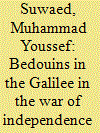

|
|
|
|
|
| Summary/Abstract |
The relations of the Bedouins with the Jewish population during the War of Independence were very complex. The Bedouins were both opponents and friends. Bedouin groups helped the Jews in their struggle against the Palestinian national movement and against the Arab armies like Arab-al-Hib. Before the foundation of the state, these Bedouins had already participated in the protection of the security of the Jewish population. They supplied intelligence on events of the Arab and Palestinian sides, and also fought by the side of the Jews in the War of Independence, but at that time other groups joined the Palestinian national movement and took part in the struggle against the Jewish population, more so after the declaration of the partition plan in the United Nations. Subsequently, Bedouin fighting gangs were established and they joined the Palestinian struggle with the Jewish population.
|
|
|
|
|
|
|
|
|
|
|
|
|
|
|
|
| 2 |
ID:
177684
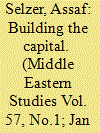

|
|
|
|
|
| Summary/Abstract |
The Declaration of Independence of the State of Israel makes no mention of the country’s aspirations regarding its borders; neither does it mention the name of the state’s capital. The absence of these features was due to the state of war that the country faced at the time of the declaration, as well as the fact that according to the Partition Plan (UN Resolution 181), Jerusalem was supposed to come under international control. This article discusses Israel’s actions in the area of Jerusalem under its control. In December 1949, it was officially decided to transfer the institutions of government to Jerusalem. The state institutions were initially scattered around the city, but a government compound began to be developed later. The article will focus on the development of this compound, presenting the decisions that were implemented in order to turn it into a capital within a city.
|
|
|
|
|
|
|
|
|
|
|
|
|
|
|
|
| 3 |
ID:
134168


|
|
|
|
|
| Publication |
2014.
|
| Summary/Abstract |
This article argues that the history of irregular warfare provides a valuable analytical and critical perspective for the study of counterinsurgency campaigns and counterinsurgency doctrine. A focus on the history of irregular warfare highlights the close relationship between warfare in Europe and in the colonies. Moreover, it enables us to identify more exactly the intersection of multiple factors that lead to an escalation of violence in small wars. Finally, it also sheds light on the lack of strategic reflection on the use of irregular auxiliaries that is characteristic for many counterinsurgency campaigns.
|
|
|
|
|
|
|
|
|
|
|
|
|
|
|
|
| 4 |
ID:
174371
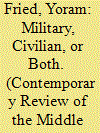

|
|
|
|
|
| Summary/Abstract |
Over the years, attempts to define the notion of national security in terms of what it means and what it represents have ranged from a classical, purely military definition, to a broader multidimensional concept encompassing a range of different features. Studies on Israel’s national security concept have tended to emphasize the formative role played by David Ben-Gurion, Israel’s first prime minister and defense minister. These works have focused on the military aspects of the national security concept, based on arguments concerning the perceived threat of wartime engagements with Arab armies. This article argues that Ben-Gurion’s national security concept was essentially a civilian perspective with military features that responded to the four types of threats, local, regional, international, and Jewish, facing the State of Israel at the time, most of which were not military.
|
|
|
|
|
|
|
|
|
|
|
|
|
|
|
|
| 5 |
ID:
130509
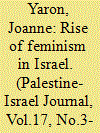

|
|
|
|
|
| Publication |
2011.
|
| Summary/Abstract |
what we know today as the state of Israel was not really established as an independent state in 1948 following what is called the "war of independence. It was established slowly, step by step, by waves of Jewish Immigration to what was then know as Palestine, a province of the fading Ottoman Empire. At the time, the main source of this immigration were Czarist Russia and the United Kingdom.
|
|
|
|
|
|
|
|
|
|
|
|
|
|
|
|
| 6 |
ID:
151757


|
|
|
|
|
| Summary/Abstract |
This essay aims to redescribe key moments in the history of American military engagements to account for a persistent role that law has played in these conflicts. The law of war tradition has persisted since the War of Independence, we argue, because of an internal dynamic that makes it both strategically useful and costly for the United States to commit itself to rule-bound warfare. Invoking the laws of war to advance the strategic interests of the United States, American soldiers and statesmen have found, entails consequences beyond their control, making reversals in position more costly and enabling critiques in the language of the law. These entailments, we argue, are built into the enduring strategic value of the laws of war. The law has remained useful not because it can claim perfect neutrality, but because it has force independent of the interests for which it is mobilized.
|
|
|
|
|
|
|
|
|
|
|
|
|
|
|
|
| 7 |
ID:
123877
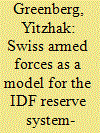

|
|
|
|
|
| Publication |
2013.
|
| Summary/Abstract |
Among military personnel who were present at the birth of the Israel Defense Forces (IDF) and among researchers, there is a widespread opinion that the influence of the Swiss armed forces can be seen in the system according to which the IDF was constructed after the War of Independence. That is, armed forces based on the model of a militia. A comparison between the IDF and the Swiss armed forces reveals that in Israel, as in Switzerland, the concept of a fighting nation was adopted; that is, universal conscription to compulsory service and the obligation of reserve duty for discharged soldiers, and that it is indeed possible to identify the influence of Swiss military organization in the organizational contours of the reserve service within the IDF. But a fundamental difference can be seen between the two armed forces. In contrast to the militia-type armed forces in Switzerland, the IDF was structured as a small regular army that included regular combat units as well as reserve forces comprising most of the ground forces. This difference between the IDF and the Swiss armed forces is rooted in Israel's geostrategic circumstances, the military threats it faces, and its need to ensure wide security margins, that is, an appropriate level of readiness and preparedness.
|
|
|
|
|
|
|
|
|
|
|
|
|
|
|
|
|
|
|
|
|